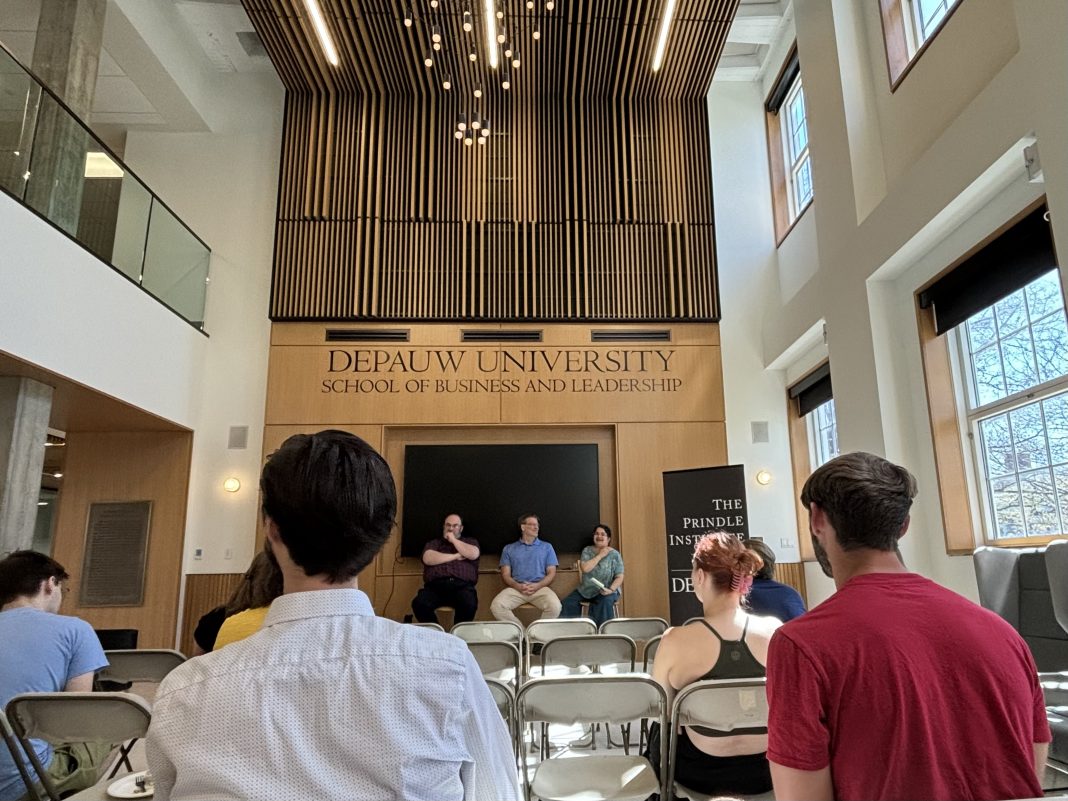On Monday, April 15, the DePauw community explored the ethical facets around the development of artificial intelligence (AI) through an intriguing discussion titled "Algorithms to Intelligence: Navigating AI Development" hosted by the Prindle Institute for Ethics. In collaboration with Women in Computer Science (WiCS) in the atrium of Harrison Hall, the event brought together a diverse panel of professors to examine the holistic impact of AI on humans on a personal and societal level.
Mediated by a Hillman Intern of the Prindle Institute, the panel provided the audience with thought-provoking perspectives on the topic of AI development with the presence of three esteemed professors, each offering unique opinions on the intersection of ethics and technology: Professor of Philosophy Erik Wielenberg, Professor of Political Science Deepa Prakash, and Professor of Computer Science Scott Thede.
Professor Wielenberge, whose research focuses on meta-ethics, shared his caution on the development of AI. He placed strong emphasis on his concerns about AI weapons, pornography, and the rise of deepfake technology, which blurs the line between reality and virtuality, posing significant ethical challenges. Professor Prakash, meanwhile, offered her thoughts on how geopolitical dynamics shape AI development. She discussed the varying regulatory frameworks adopted by different countries, highlighting the complexities of navigating AI governance on a global scale, as no government’s approach is the same. Recognizing both points of view, Professor Thede mentioned the need for national and international cooperation in AI development. He stressed that transparency and governance to ensure responsible AI deployment are crucial, citing examples of differing diplomatic approaches to AI regulation across nations.
Throughout the discussion, the panelists addressed pressing questions surrounding AI's impact on the job market, political landscape, and societal norms. All three professors agreed that AI is a unique development, having an enormous and life-penetrating power that anyone can create and own. The panel emphasized the need for education and proactive measures from governments and private entities to mitigate the negative consequences of AI while harnessing its potential for positive change.
The audience posed many questions about the future trajectory of AI development. Ending the discussion on a positive note, one audience member asked what would be AI’s potential benefits. The panel concluded that they could see a future of humans utilizing AI for its good, including its applications in therapy, medicine, and task automation. Thanks to the planning of Hillman Interns and the faculty at Prindle Institute, the audience was able to explore and express their thoughts in an engaging environment for dialogue on the ethics of AI development.
As the conversation came to a close, it was evident that AI's pervasive influence demands careful ethical consideration and proactive measures to ensure its responsible and equitable integration into society. The event served as a representative for ongoing dialogues and reflection on differing ethical dimensions of AI development, highlighting the importance of education and authority governance in shaping the future of technology. The next panel discussion held by Prindle Institute is scheduled for the beginning of May and is promised to deliver another exciting conversation. Stay tuned!

